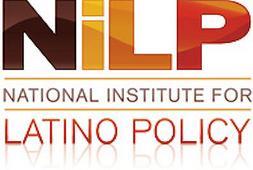
NiLP Commentary
Latinos and the Future of the Democratic Party: Recommendations for Change
By Angelo Falcón
The NiLP Report
 The so-called "Blue Wave" this past week, with which the Democrats
sometimes experienced unexpected major victories in the governor, mayoral
and state legislative seats in Virginia, New Jersey, Main, Seattle, Topeka
and elsewhere raised expectations about the party's ability to counter
Trump at the polls next year. While the DNC pointed to the effectiveness
of their strategy to run candidates in almost every available seat (their
50 state strategies of organizing and not just mobilizing) and increased
outreach to Latinos and other communities of color, they had difficulty
identifying any truly galvanizing vision they projected.
The so-called "Blue Wave" this past week, with which the Democrats
sometimes experienced unexpected major victories in the governor, mayoral
and state legislative seats in Virginia, New Jersey, Main, Seattle, Topeka
and elsewhere raised expectations about the party's ability to counter
Trump at the polls next year. While the DNC pointed to the effectiveness
of their strategy to run candidates in almost every available seat (their
50 state strategies of organizing and not just mobilizing) and increased
outreach to Latinos and other communities of color, they had difficulty
identifying any truly galvanizing vision they projected.
The reality is that rather than Democratic organizing, the main reason for their wave is growing anti-Trump sentiment, with fear of losing Obamacare and calling for greater gun control being the two key issues as well as the rejection of anti-immigrant rhetoric.(see Latino Decisions' Virginia poll for details) While it would be nice to entirely credit the leadership of DNC Chair Tom Perez for the results, the Dems probably need instead to thank Donald J. Trump and his cynical and slavish Republican followers. The Trump resistance seems to be working so far.
While this Democrat sweep resulted in some Latino firsts being elected to office throughout, it appears that the party's overall strategies remain seriously flawed as Donna Brazile's recent revelations and the response to them indicates. We have been consistently critical of the role that the Democratic Party has played in taking the Latino vote for granted and not investing in developing a stronger Latino leadership pipeline within the party and in public office. How is it possible, for example, that the Republicans have gotten two Latino governors elected while the Democrats have produced none?
In survey after survey of national Latino leaders we have conducted, they overwhelmingly complain that the Democratic Party is not responsive to one of its most loyal constituencies, Latinos. There is also a strong sentiment that DNC Chair Perez has not done enough to change this perception and reality. But, at the same, they don't seem to have any faith in the notion that there currently exists a viable third party option for Latinos (and apparently no faith in a Republican alternative).
These feelings about the Democratic Party and Latinos is supported by a new report, "Autopsy: The Democratic Party in Crisis" by Karen Bernal, Pia Gallegos, Sam McCann, and Norman Solomon that was supported by Action for a Progressive Future. It found that one major problem facing the party in 2016 was that ". . . Latinos cast ballots for Clinton at a 66 percent clip, down 5 percent from Obama's 2012 numbers despite Clinton's opponent calling Mexican immigrants "rapists" and placing a border wall at the center of his platform." The problem, they concluded was that "Rather than invest in a coalition of people of color, Democrats spent lavishly on white suburban voters, as per Schumer's formula.
On Latinos, they elaborated as follows:
"Inadequate outreach extended to Latino voters as well. The Congressional Hispanic Caucus critiqued the Clinton campaign's strategy, saying it did not hire enough Latino consultants who had experience working with the communities that outreach efforts were meant to target. This shortcoming should have been addressed well before the campaign ramped up. In 2014, Albert Morales, then the Hispanic Engagement Director at the Democratic National Committee, proposed a $3 million plan aimed at raising voter turnout in Arizona, Colorado, Florida, New Mexico and Texas. Despite the meager cost, the plan was nixed. 'I just asked for what I needed,' Morales said. \I ended up getting closer to $300,000, and it all went to radio.... It was just pitiful.' (This $300,000 for Latino outreach in those five states ended up being less than a third of the $1 million the campaign-coordinating Super PAC Correct the Record pledged to spend on social media accounts to counteract anti-Clinton comments on Twitter and Reddit.) The lack of funding was compounded by poorly-timed spending; the Clinton campaign did not launch a sustained Spanish-language ad campaign until September, putting her well behind the calendar successfully implemented by the Obama campaign in 2008 and 2012."
But the problem is not just with the Democratic Party's inadequate outreach to Latino voters, but to its persistent and disastrous failure to more seriously engage and integrate Latinos into its operations in ways that. unfortunately, reflect perspectives ranging from white paternalism to even what I see as a "trickle-down progressivism." The progressive "Autopsy" report provides a series of recommendations for addressing this problem, but they are very general and do not provides a useful operational agenda for Latino progressives to pursue within the party.
What, therefore, should the DNC be doing to more fully bring in Latinos? Taking recommendations made by DNC Deputy Chair Keith Ellis as a part of departure, along with other sources, I compiled the following set of ideas for the DNC and Latino Democratic leaders to consider adopting and advocating for:
Framing Latino Issues
The DNC should oppose any simplistic approaches to so-called "identity politics" and the creation of an artificial and divisive prioritizing of the white working class over people of color in voter mobilization
The DNC must speak up any time the Latino community is disproportionately affected by a piece of legislation or an executive action of the President.
- One way to address this is with the creation of a database of Latino organizations that focus not just on immigration reform, but also on climate change, universal healthcare, and other issues of importance to the Latino community, and engage them regularly.
The DNC must make the restoration of full voting rights and increasing in-language voting assistance and outreach top priorities. This includes the restoration of the full protections of the Voting Rights Act and ensuring that the protections that still exist, including voter assistance and the provision of bilingual voting materials in required jurisdictions, are enforced.
Latino Inclusion
Investing in the development of a more effective leadership development program that takes promising Latino elected and candidates to groom them for a robust pipeline for higher office.
- Create DNC-sponsored candidate training programs to win local races, and make sure that Hispanic candidates are ready to run for office across the country. In the process, the DNC should engage with Hispanic business leaders, operatives, and all others who want to build our party's bench.
Latinos need to be fully incorporated into all leadership positions and not used merely as high-profile tokens
- Latinos need to be fairly represented on the entire DNC staff, based on an intentional hiring process that creates a diverse applicant pool and candidate selection.
- There must be a commitment to hire a full-time constituency staff-person for the Hispanic Caucus and to have at least one person in each DNC Department who is fluent in Spanish.
-
Efforts need to be promoted to develop a strong and fully engaged Latino
delegation for the 2020 Convention
- This would be greatly strengthened by the elimination of the party's undemocratic Super Delegate system.
There is an overarching need to assure that Latinos are fully represented in the party's new 50-state strategy
The DNC needs to provide sufficient staffing and resources to assure that state Latino caucuses are active and engaging with each other to give the DNC ongoing feedback on effective outreach strategies.
- This should be facilitated with the creation of a comprehensive database of Latino Democratic elected and party officials to promote greater communication between and with them on party policy and strategic discussions.
- Resources and training should be provided the Latino caucuses on the latest technology and data for their full engagement in the redistricting process and in ways to fully include participation in this process by the grassroots Latino community.
There is a need for a special outreach initiative to attract young Latinos to participate at all levels in the party and to groom a new generation of party activists and candidates.
- This includes the need to prioritize adding young Latinos to the Democratic National Committee to create a pipeline for people from across the Latino spectrum to better engage at all levels of the party. This should include creating and promoting opportunities for Latino youth to serve at local campaign efforts.
- The DNC needs to also reach out to Latino veterans - from those who have served in World War II to those who have served in Iraq and Afghanistan recently - and make sure that the party is addressing their concerns and fighting on their behalf.
Latino Outreach
Develop an adequately-funded fully multimedia Spanish-language department and strong public education campaigns in Latino communities about the party's platform and priorities directly affecting Latinos
- Make significant investments in Spanish-language and other Latino media
Set aggressive goals for the increased contracting of Latino vendors and political consultants in support of party operations
- Hire a Latino polling firm, like Latino Decisions, who can help guide the DNC's outreach to the Hispanic community, as well as conduct regular messaging meetings with National and regional Hispanic stakeholders.
Visit states with large Hispanic populations, like California, Florida, Texas, New York and New Jersey but also states that have the fastest growing Hispanic populations, like South Carolina, Tennessee, and Georgia.
- Increase the DNC presence in key national and state Latino civic, labor, business and other community-based organizations and events.
Can these ideas be the basis for a much-needed discussion within the Latino community about how to hold the Democratic more accountable to its needs? Considering the long-term loyalty of the majority of Latino voters to Democratic candidates and the current political crossroads the party is in, this is a discussion that cannot be simply left to party insiders but needs to be raised within the broader Latino community.
It is also an agenda that needs to be more aggressively and publicly pursued by Latino party leaders like DNC officers Tom Perez, Maria Elan Durazo. Henry R. Muñoz III, and state party leaders like New York's Nydia Velazquez, California's Alexandra "Alex" Gallardo-Rooker, Texas' Gilberto Hinojosa, and New Mexico's Neomi Martinez-Parra, among other party functionaries.
Will they and the broader Latino leadership by up to the challenge this represents? While the 2018 elections will provide the first evidence, it will be more important what the DNC does starting now.
Angelo Falcón is President of the National Institute for Latino Policy (NiLP) (www.latinopolicy.org). He can be reached at afalcon@latinopollicy.org.
_______________________________________________________________________________________________________
The NiLP Report on Latino Policy & Politics is an online information service provided by the National Institute for Latino Policy. For further information, visit www.latinopolicy. org. Send comments to editor@latinopolicy.org.